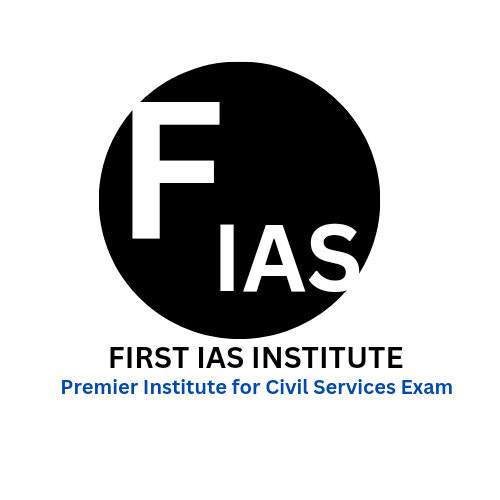.jpg)
UPSC Interview Tips and Tricks By FIRST IAS INSTITUTE
Congratulations on reaching the pinnacle of the UPSC exam - the IAS interview! This phase can appear as the most challenging, but fear not - we're here to guide you through. As every dedicated IAS aspirant understands, preparation holds the golden key. With the correct advice and a positive attitude, confidently enter the interview room. Prepared to display your true abilities to the esteemed panel.
The IAS interview is the ultimate assessment of your personality, communication skills, and suitability for a civil services career. The Preliminary and Main Examinations lead up to it. It is the deciding factor for prestigious roles such as IAS. Anticipate questions, practice your responses and focus on presenting an authentic version of yourself. With this thorough method, you'll navigate the interview successfully. It will also pave the way for an exciting career as an IAS officer. Embrace the challenge - you have come this far, and you are ready for this! Let us dive into some tips and tricks:
How to Prepare for Your UPSC Interview
The interview is your chance to shine and make a memorable impression. Come prepared to discuss your application and interests in detail.
- Do your homework: Review your DAF and application. This will refresh your memory. Focus on the experiences and qualifications you highlight. Be ready to elaborate on them.
- Practice your answers: Prepare for commonly asked questions and practice your responses. Discuss your interests, goals, and how you'll contribute to public service. Focus on your strengths and what makes you exceptional.
- Dress professionally:First impressions matter. Dress in formal business attire to show your respect for the process.
- Make eye contact:Engage each member of the panel to establish a personal connection. Maintain enthusiastic body language to show your passion.
- Discuss current affairs: Brush up on the latest events and issues to showcase awareness. Improve analytical abilities as well. This will help you when asked about them. Refer to recent government initiatives and policies.
- Ask good questions: Come prepared with thoughtful questions. These questions should show your knowledge and interest in the role and organisation.
- Be authentic: While preparation is key, don't sound scripted. Share your genuine self - your values, motivations, and personality. Let your passion for public service shine through!
To engage in a meaningful discussion about your potential, you should cultivate your right mind and come prepared. Remember, the interview is your opportunity to stand out – so make the most of it!
Common Civil Service Interview Questions and How to Answer Them
When it comes to the interview, preparation is key. Do your homework and study common questions so you can go in with confidence. Some questions are bound to come up, so have answers ready.
-
Why do you want to join the civil services?
Discuss your motivation and passion for public service.
-
What are your strengths and weaknesses?
Focus on strengths that are important for a civil servant role. These strengths include logical reasoning, communication, and integrity. For weaknesses, discuss how you're improving them.
-
Why should we hire you?
Highlight relevant experience, skills, and your desire to help citizens. Explain why you're the best candidate for the job.
-
How would you handle a tricky situation?
Share an example of a difficult scenario you navigated successfully. Discuss the thought process behind your solution.
With the right preparation, you'll be ready to show the interview panel why you deserve to be India's next civil servant. Now get out there and wow them! You got this.
Tips for Making a Great Impression at Your UPSC Interview
- Make Eye Contact and Smile
When you first enter the interview room, make sure to smile, make eye contact, and greet the interviewers enthusiastically. Your body language and confidence can make a strong first impression. Maintain friendly eye contact, sit up straight, and appear engaged throughout the interview. Nod, smile, and react appropriately to show you are listening. Your positive attitude and passion for the role will shine through.
Things to Avoid During Your IAS Personality Test
- Avoid Being Arrogant
During your interview, be confident but not arrogant. The panel wants to see that you have a realistic assessment of your abilities and potential. If you appear arrogant or overconfident, it may create leadership problems. This is due to an unrealistic view of yourself.
Avoid statements that make you seem unbeatable or imply you think you are superior to others. Don't focus so much on your accomplishments that you fail to acknowledge your weaknesses or areas that still need development. Show that you are open to learning and improving yourself throughout your career.
It's great to be enthusiastic about becoming an IAS officer. But, don't make it seem like it's the only career for you. Also, avoid feeling entitled to the role. Stay humble and remember that there are many strong candidates and not everyone who is deserving will receive an appointment. Focus on conveying your genuine passion for public service rather than a sense of entitlement.
Following Up After the Interview: Sending Thank You Emails
Sending a thank you email after your IAS interview is polite. It is a professional gesture that can leave a good last impression. Within 24 hours of your interview, draft a brief email. In this email, express your appreciation for their time to your interviewer(s).
- Mention one or two specific points of discussion that you found particularly interesting. For example, you might say something like.
- I especially enjoyed our conversation about the environmental policy challenges facing India. Engaging in discussions with experts like you enhances my perspectives. It is insightful to discuss solutions for issues like air pollution. Conversations about waste management also contributed to my understanding.
- Reiterate your enthusiasm for and commitment to public service. For example:
- My passion for serving the people of India remains as strong as ever. I appreciate your consideration of my candidacy for this opportunity.
Thank the interviewer(s) again for their time. For example:
- Thank you again for taking the time to interpret me. I sincerely appreciate your feedback and consideration.
Sending a thank you email is a meaningful way to wrap up the interview process. Showing interest in the role and being professional. Take the time to personalise your message-it can make an impact.
Conclusion:
In conclusion, armed with these tried-and-tested tips from seasoned experts, you are well-equipped to conquer the IAS interview. The path to success lies in thorough preparation and self-confidence. Take the time to delve into your studies, anticipate potential questions, and diligently practice your responses. Your objective should be to present the most genuine and authentic version of yourself. The interview panel seeks evidence of your personality, communication skills, and the temperament required for effective civil service.
Believe in your abilities. Maintain a positive mindset. Approach this interview as an opportunity. Engage in a discussion about your passions and aspirations. You have successfully navigated the earlier stages of this challenging process, and now, it's time to seal the deal. Soon enough, you'll find yourself on the exciting path to a career as an IAS officer. Remember, you got this! Embrace the journey. Stay true to yourself. Go confident toward the fulfilling future that awaits you. This future lies in the realm of civil services.






